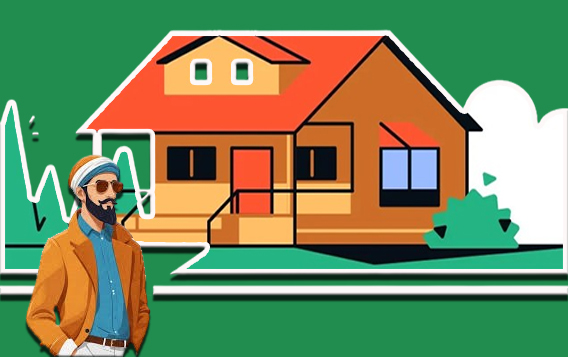As a mobile homeowner, you have specific home insurance requirements. HO-7 home insurance policy can be useful in this situation. An HO7 policy, also referred to as an MH3, covers the construction of manufactured and mobile homes against all risks except those that are excluded.

HO-7 coverage is often available for live-in RVs and single- and double-wide mobile homes. You might need to purchase additional coverage while your mobile home is in transit if you intend to move or travel with it. In addition, the HO-7 policy covers personal property, loss of use, dwellings and other constructions, personal liabilities, and other people’s medical costs.
What is an HO-7 Insurance Policy
HO-7 policy is a kind of home insurance that covers single-wide, double-wide, and triple-wide mobile homes on an open peril basis. Generally, it is sometimes referred to as an MH3 policy, manufactured house insurance, or mobile home insurance.
This means that every occurrence, excluding those specified as exclusions in the policy, is covered for your home. Furthermore, property is insured for replacement costs on a named-perils basis, which means it covers only the occurrences listed in the policy.
Types of Coverage for the HO-7 Insurance Policy
The mobile home is covered on an open-peril basis by a HO-7 policy. Moreover, this indicates that any risks not expressly included in the contract are covered by the mobile home. In addition, the HO-7 policy covers personal property, loss of use, dwellings and other constructions, personal liabilities, and other people’s medical costs.
Personal property
This assists you with covering the cost of replacing or repairing damaged or stolen personal property, such as clothing, gadgets, and furniture. There is also a cap on this coverage.
Loss of use
If there is covered damage to your mobile home, loss of use coverage will cover lodging, meals, and daily living expenses. For instance, the insurance company would cover the cost of a short-term hotel stay, if water damage in your kitchen rendered your house uninhabitable for several days.
Dwelling
This assists you in covering the cost of replacing or repairing your house in the event of a natural disaster like a fire or storm. You will be prompted to select a coverage limit when you purchase a HO-7 policy. This is the most that the insurance provider will provide you with for a claim. Additionally, any costs over the cap have to be covered out of your pocket. That’s why you should base your coverage limit on what it would cost to rebuild your house if it is damaged.
Other structures
This aids in covering the cost of repairing long-term fixtures like fences and sheds that are separate from the primary residence. Moreover, the coverage B limit is expressed as a percentage of the coverage A limit. Your insurer will pay up to $15,000 for a coverage B claim if your coverage A limit is $150,000 and your coverage B limit is 10% of that amount.
Personal liabilities
Financial security is offered by liability insurance if you are judged liable for an injury or property damage suffered by someone. Say someone is hurt in your house and files a lawsuit against you for the amount of their medical bills. Both their costs and your legal fees would be covered by your coverage. Subject to a cap, your coverage often covers events that happen both on and off your property.
Medical expense
If someone is hurt in an accident or stays in your mobile home, the medical costs are covered by your HO-7 insurance. Reviewing your coverage options is important because the policy has some limitations.
What Does an HO-7 Insurance Policy Cover
Your personal property is covered somewhat differently under the HO7 coverage. As it is only covered for occurrences specified in the policy, this is covered on a “named peril” basis. Your property is usually covered by insurance against these 16 specific risks:
- Lightning or fire.
- Hail or windstorm.
- Unrest or civil unrest.
- Vehicles that smoke.
- Theft vandalism.
- Falling items.
- The mass of snow, ice, or sleet.
- Unintentional overflow or leakage of water or a stream.
- Eruption of a volcano.
- Unexpected, unintentional breaking, chipping, or burning of integrated equipment, like an oven or water heater.
- Unexpected and inadvertent harm is caused by the electrical current generated.
Your personal property isn’t insured for events that aren’t on this list (unless you add an endorsement).
What Does an HO-7 Insurance Policy Not Cover
Your HO-7 policy will have an exclusions list in addition to the list of risks it does cover. A few risks that are not covered by mobile home insurance are as follows:
- Flood-related damage.
- Sinkholes, earthquakes, or any other kind of earth movement.
- Problems with upkeep or deterioration that happen over time.
- Ignorance or typical aging.
- Outage of power.
- Purposeful loss.
In addition, if your mobile home is damaged in transit, most HO-7 policies won’t cover it. You might be able to add an endorsement to your insurance policy to safeguard your mobile home while it’s being moved around, depending on your insurance provider.
How Much Does the HO-7 Insurance Policy Cost
The cost of homeowner’s insurance is determined by a variety of factors, including the location of your mobile home. According to insurance.com, the national average projected price for regular homeowners insurance is $2,285. To check how much homeowners insurance costs in your region, search for local rates.
We want to assist you with your mobile home insurance needs. Take 60 seconds to get a home insurance quote today.
How to Get an HO-7 Insurance Policy
Manufactured and mobile home insurance is provided by a few national insurers, including Allstate and State Farm. Working with insurance companies that specialize in insurance for mobile homes is another option. It’s important to compare prices from both state and local insurers while looking for insurance.

